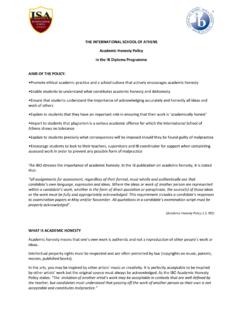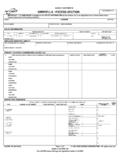Transcription of Raising Concerns Policy and Procedure - STHK
1 Page 1 of 27 Raising Concerns Policy and Procedure Version 3 Policy Reference number: STHK0022 DOCUMENT NUMBER STHK0022 APPROVING COMMITTEE Workforce Council DATE APPROVED January 2016 DATE IMPLEMENTED January 2016 NEXT REVIEW DATE February 2018 ACCOUNTABLE DIRECTOR Director of Human Resources Policy AUTHOR Head of Human Resources TARGET AUDENCE All Trust Staff including those employed by the Lead Employer KEY WORDS Whistleblowing, Raising Concerns , Sir Robert Francis, Freedom to Speak Up, PIDA 1998, Speak out Safely, Bribery Act 2010 Important Note: The Intranet version of this document is the only version that is maintained. Any printed copies should therefore be viewed as uncontrolled and, as such, may not necessarily contain the latest updates and amendments. Raising Concerns Policy and Procedure Document Summary This Policy provides all staff with information and guidance on Raising Concerns appropriately.
2 (This Policy may also be referred to as the Whistle Blowing Policy ). Page 2 of 27 Raising Concerns Policy and Procedure Version 3 Policy Reference number: STHK0022 CONTENTS Item No. Subject Page No. 1. Scope 3 2. Introduction 3 3. Statement of Intent 5 4. Definitions 5 5. Duties, Accountabilities and Responsibilities 6 6. Process 9 7. Training 12 8. Monitoring compliance 13 Key Performance Indicators of the Policy 13 Performance Management of the Policy 13 9. References and Bibliography 14 10. Related Policies and procedures 14 11. Appendices Appendix 1 Equality Impact Analysis Appendix 2 Flowchart for Raising Concerns Appendix 3 - Raising Concerns Form Appendix 4 - Internal Support Appendix 5 - Trade Union & External Support Organisations Appendix 6 - Lead Employer Raising Concerns Responsibility & Policy Matrix for Guidance 15 15 18 20 24 25 27 Page 3 of 27 Raising Concerns Policy and Procedure Version 3 Policy Reference number: STHK0022 1.
3 SCOPE This Policy applies to all staff and services within St Helens and Knowsley Teaching Hospital NHS Trust, and includes bank and agency workers, trainees, contracted staff and self-employed NHS professionals. Lead Employer staff should refer to the Matrix (Appendix 6) for advice on which process and Policy should apply when Raising a concern . 2. INTRODUCTION St Helens and Knowsley Teaching Hospitals NHS Trust pledge is to encourage the immediate reporting of Concerns and to support staff fully in feeling able to do so. The aim of this Policy is to provide an internal mechanism for reporting, investigating and remedying any wrongdoing in the workplace. The Policy reflects the recommendations made by Sir Robert Francis Freedom to Speak Up review published in February 2015. The Trust has also committed to the Speak out Safely campaign, with the specific purpose of creating a culture that is transparent, supportive and responsive to managing unacceptable behaviour or practice.
4 It is important for individuals to feel safe and listened to when Raising Concerns with appropriate support for the individual available. An open approach to Raising a concern /whistleblowing promotes the values of openness, transparency and candour and encourages staff to treat patients and services users with dignity, respect and compassion. Raising a concern is making a disclosure in the public interest and occurs when an employee raises a concern about danger or illegality that affects others, for example members of the public. NHS Constitution The NHS Constitution pledges, (March 2013) that the NHS will encourage and support all staff in Raising Concerns at the earliest reasonable opportunity about safety, malpractice or wrongdoing at work, responding to and, where necessary, investigating the Concerns raised and acting consistently with the Public Interest Disclosure Act 1998.
5 During your employment with the Trust you are obliged to adhere to the NHS Constitution and its principles and values. You must be aware of your Duty of Candour which means that you must be open and honest during your employment; if you see something wrong you must raise it. As a worker in healthcare there are also moral, ethical and professional issues to consider in relation to Raising Concerns . Staff registered with professional regulatory body must make themselves familiar with their registration requirements and obligations. Page 4 of 27 Raising Concerns Policy and Procedure Version 3 Policy Reference number: STHK0022 This Policy does not affect existing policies and procedures for dealing with complaints or grievances. Raising a concern is about reporting a concern at work, and the Public Interest Disclosure Act 1998 only applies to workers Raising a concern at work.
6 Consequently, the process cannot be used by a service user to make a complaint about poor care they should ask to see the Trusts complaints Procedure . When an individual raises a concern they should consider whether it is a qualifying whistleblowing issue or whether the matter is a personal employment issue which would be more appropriately dealt with through the Trusts grievance Procedure . What the Law Says Public Interest Disclosure Act 1998 The Public Interest Disclosure Act 1998 became law in July 1999 (PIDA). It provides legal protection against detriment for workers who raise Concerns in the public interest (also known as making a disclosure) about a danger, risk, malpractice or wrongdoing in the workplace which affects others. To be protected, the disclosure must be in the public interest, the worker must have a reasonable belief that the information shows that one of the categories of wrongdoing listed in the legislation has occurred or is likely to occur and the concern must be raised in the correct way.
7 PIDA details six subject areas under which disclosures have to fit so as to be qualifying disclosures 1. Criminal offences 2. Failure to comply with legal obligations 3. Miscarriages of justice 4. Threats to health and safety of an individual 5. Damage to the environment 6. A deliberate attempt to cover up any of the above Therefore any member of staff who makes a disclosure or raises a concern under the Procedure detailed within this Policy will be protected if the following are observed: You must disclose the information in good faith You must believe it to be substantially true You must not act maliciously or make false allegations You must not seek any personal or financial gain Page 5 of 27 Raising Concerns Policy and Procedure Version 3 Policy Reference number: STHK0022 OF INTENT This Policy will provide a framework to ensure that Concerns can be investigated promptly and in a manner which recognises the sensitivity of the issues raised and the rights of all parties involved.
8 It is designed to enable Trust Staff to raise Concerns internally, by following the appropriate channels. Examples of Concerns include: Malpractice or ill treatment of a patient by a member of staff Patients, the public or employees who have been or may be put at unnecessary risk A breach of a professional code of conduct/ethics Suspected fraud, bribery or corruption A criminal offence has been committed, is being committed or likely to be committed in or out of the workplace Committing a miscarriage of justice Disregard of legislation, particularly in relation to health and safety at work Creating health and safety risks or environmental damages Showing undue favour over a contractual matter or to a job applicant Personal relationships affecting professional performance Inappropriate use of IT or social media in relation to a patient Inappropriate use of Trust property, equipment or medicines Information on any of the above has been, is being.
9 Or is likely to be concealed This list is not exhaustive and there will be other instances where use of this Policy is appropriate. Where there is suspicion of harassment, intimidation or bullying of staff by other staff members the Respect & Dignity at Work Policy should be referred to. PIDA 1998 The Public Interest Disclosure Act 1998 Lead Employer The contract for the Single Lead Employer Service was awarded to St Helens and Knowsley Teaching Hospitals NHS Trust in 2010. This resulted in the transfer of all Mersey and Cheshire doctors in training from six previous Lead Employer organisations to St Helens and Knowsley NHS Trust. As a Single Lead Employer the Trust is responsible for all Doctors in Training engaged on hospital placements, which also include placements in GP practices, Independent Hospices and with agencies such as the Health Protection Agency. In addition in 2016 the Lead Employer became responsible for employing Student Physician Associates who are placed for their academic placements at the University of Central Lancashire, the University of Liverpool and the University of Manchester and for their clinical placements at sponsoring organisations across the North West of England.
10 Trainee s/SPA s rotate to a number of Host Organisations/Sponsoring Organisations Page 6 of 27 Raising Concerns Policy and Procedure Version 3 Policy Reference number: STHK0022 or their Universities during their placements ranging across Foundation Trusts to District General Hospitals, GP Practices and public health speciality registrars. Each Host Organisation/Sponsoring Organisation or University will manage the day to day requirements of the trainee/SPA as though the trainee/SPA was theirs however the Single Lead Employer model requires a distinctive set of policies and processes to ensure consistency and equity of application is maintained regardless of where the trainee/SPA is placed. It is important that open channels of communication are maintained with key stakeholders in Raising Concerns and this Policy sets out the framework to facilitate this. 5. DUTIES ACCOUNTABILITIES AND RESPONSIBILITIES The Chief Executive The Chief Executive is responsible for a decision as to whether there are sufficient grounds to proceed to a formal investigation.







